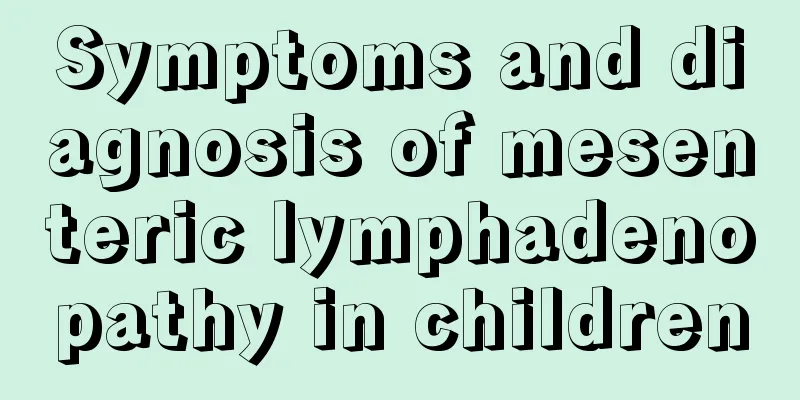Symptoms and diagnosis of mesenteric lymphadenopathy in children

|
Do you know what is the cause of children's mesenteric lymphadenopathy? We cannot ignore this situation of children. What we can do is to understand the manifestations and diagnosis methods of children's mesenteric lymphadenopathy. We must discover the children's problems as early as possible and solve them in time. Then let's take a look at the introduction of our experts below! 1. Clinical manifestations It is common in children under 15 years old. After an upper respiratory tract infection, they have sore throat, fatigue and discomfort, followed by abdominal pain, nausea, vomiting, and fever. The abdominal pain is more common around the navel and right lower abdomen, and is paroxysmal, with tenderness and rebound pain, and the pain point is not fixed. 2. Inspection The white blood cell count may increase, with occasional lymphocytes and an increased proportion of monocytes. 3. Diagnosis A diagnosis can be made based on the above symptoms, signs and laboratory tests. 4. Differential diagnosis It should be differentiated from appendicitis and tuberculous mesenteric lymphadenitis. It is generally believed to be caused by bloodstream infection of streptococci, and some believe it is related to intestinal inflammation and parasitic diseases. It is more common at the end of the ileum. Lymph nodes are multiply congested and swollen. There may be a small amount of inflammatory exudate in the abdominal cavity. Under the microscope, lymph sinus dilation can be seen, and neutrophils enter the lymph sinus from small blood vessels and phagocytize bacteria. Some white blood cells may degenerate and collapse as a result, forming cell fragments or denatured substances. The blood vessels in the lymph nodes are also dilated and congested, the germinal centers proliferate, and the sinus cells and immune blasts proliferate. Acute mesenteric lymphadenitis is more common in children under 7 years old. Before the onset of the disease, there are often prodromal symptoms such as sore throat, fever, fatigue and discomfort, followed by umbilical and right lower abdominal pain, nausea, vomiting, and sometimes diarrhea or constipation. This course of disease is exactly the opposite of acute appendicitis, which first causes abdominal pain and then fever, and the body temperature rises sharply in the early stage of the disease. During physical examination, there may be tenderness in the umbilicus and right lower abdomen, with a wide range and no fixed tenderness point. Because the abdominal muscles of children are not well developed, the tension of abdominal muscles may not be obvious. Sometimes small nodular masses can be palpated. The white blood cell count is increased or normal. If it is caused by streptococci, abdominal puncture can extract a thinner grass-green liquid, and smears can find Gram-positive cocci. If the medical history is relatively typical, the range of abdominal tenderness is relatively wide, and there is no abdominal muscle tension, non-surgical treatment can be performed first, intravenous antibiotics, or heat-clearing and detoxifying agents can be used. Changes in abdominal signs should be closely observed. If the symptoms worsen and are difficult to distinguish from diseases such as appendicitis and Meckel's diverticulitis, laparotomy and appendectomy are still appropriate. The treatment method is conservative therapy, with ampicillin 0.1g/(kg?d) plus 0.9% normal saline, intravenous drip twice a day, combined with metronidazole intravenous drip once a day. For patients with severe fever and abdominal pain, dexamethasone 5mg/time is added, and dexamethasone should not be used for more than 3 days. After 2 days, the white blood cell count has decreased significantly and the symptoms have been significantly relieved. Continue to consolidate the treatment for 1 week. After 2 to 3 days of treatment, the fever has mostly subsided, the white blood cell count has decreased significantly, and the abdominal pain symptoms have been significantly relieved. After 1 week of anti-infection treatment, most patients have recovered and been discharged from the hospital. We are most concerned about the health of our children. I believe that parents all think so. It is true that we cannot ignore the pain brought to children. Parents are most concerned about the health of their children. So do you know how to do it? I hope the explanation given by the experts above can benefit you! |
<<: What are the symptoms of swollen lymph nodes behind the ears in children?
>>: How to treat swollen lymph nodes behind the ears in children
Recommend
What are the common symptoms of premature babies at 33 weeks of pregnancy?
What are the common symptoms of premature babies ...
How to measure children's IQ?
Many parents are very concerned about their child...
Symptoms of voice change
Voice change is a stage that must be experienced,...
At what age is it better for children to sleep alone?
Children are very cute and like to sleep next to ...
Can vitiligo in children be cured?
In this era, every parent pays great attention to...
Treatment of cough, nasal congestion and sneezing in newborns
The first thing to do for a newborn baby with nas...
Treatment of red pimples on eight-month-old baby
When a baby first comes into this world, his body...
Baby foot massage method
The immunity of newborn babies is relatively low,...
Symptoms of hypospadias in children
Hypospadias is a disease that often occurs in you...
Is baby's stiffening while feeding a symptom of cerebral palsy?
When a young mother is breastfeeding her baby, if...
Why does a six-year-old child sweat while sleeping at night?
When sleeping at night, you will sweat a lot for ...
Treatment for night sweats in babies
Many of our babies may have night sweats, which i...
Treatment of diarrhea in newborns on the 20th day
A newborn baby with diarrhea at 20 days old looks...
Children's stool is dry and hard
In the past when medical technology was not under...
Is it good for children to eat seaweed? What to watch out for
Nori is also called laver, but nori is more proce...









